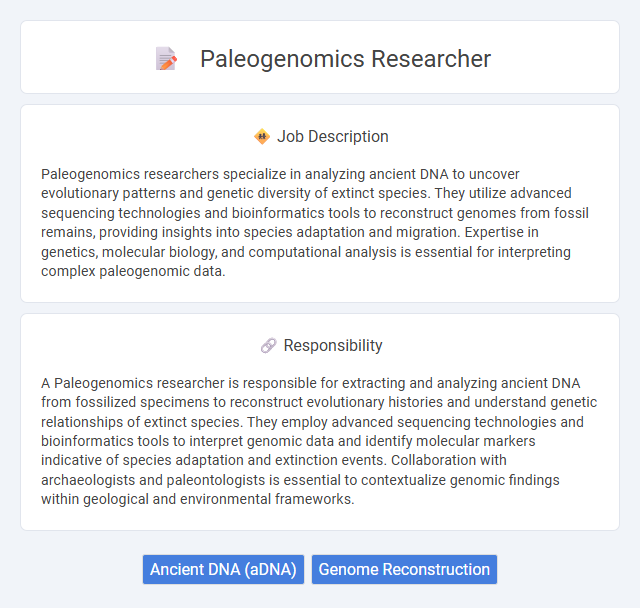
Paleogenomics researchers specialize in analyzing ancient DNA to uncover evolutionary patterns and genetic diversity of extinct species. They utilize advanced sequencing technologies and bioinformatics tools to reconstruct genomes from fossil remains, providing insights into species adaptation and migration. Expertise in genetics, molecular biology, and computational analysis is essential for interpreting complex paleogenomic data.
Individuals with strong analytical skills and a passion for evolutionary biology are likely to thrive in Paleogenomics research roles. Those comfortable working with complex genetic data and bioinformatics tools may find this career suitable. Candidates who are patient, detail-oriented, and adaptable to interdisciplinary collaboration will probably excel in this field.
Qualification
Paleogenomics researchers require advanced degrees in genetics, molecular biology, or evolutionary biology, often holding a PhD with specialization in ancient DNA analysis. Proficiency in bioinformatics tools and next-generation sequencing technologies is essential for reconstructing genomes from degraded samples. Experience with archaeological specimen handling, contamination prevention, and multidisciplinary collaboration enhances effectiveness in this specialized field.
Responsibility
A Paleogenomics researcher is responsible for extracting and analyzing ancient DNA from fossilized specimens to reconstruct evolutionary histories and understand genetic relationships of extinct species. They employ advanced sequencing technologies and bioinformatics tools to interpret genomic data and identify molecular markers indicative of species adaptation and extinction events. Collaboration with archaeologists and paleontologists is essential to contextualize genomic findings within geological and environmental frameworks.
Benefit
Paleogenomics researchers are likely to benefit from advancing our understanding of ancient DNA, potentially transforming knowledge about human evolution and extinct species. The job may offer opportunities to work with cutting-edge sequencing technology and interdisciplinary collaboration, increasing professional growth. Competitive salaries and access to academic funding could further enhance job satisfaction and career stability.
Challenge
Paleogenomics researchers likely face significant challenges in extracting and analyzing ancient DNA due to its degradation over time, which may complicate data accuracy and interpretation. The probability of contamination and limited sample availability often hinders the reconstruction of evolutionary histories. Advanced technology and innovative methodologies are probably essential to overcome these obstacles and ensure reliable findings.
Career Advancement
Paleogenomics researchers specialize in analyzing ancient DNA to uncover evolutionary histories, contributing to breakthroughs in genetics and anthropology. Career advancement typically involves progressing from research assistant to principal investigator roles, often requiring publication in high-impact journals and securing competitive grants. Mastery of bioinformatics tools and interdisciplinary collaboration enhances opportunities for leadership positions within academic institutions or biotech companies focused on ancient DNA analysis.
Key Terms
Ancient DNA (aDNA)
Paleogenomics researchers specializing in Ancient DNA (aDNA) analyze genetic material extracted from archaeological and fossil remains to reconstruct the genomes of extinct species and ancient populations. Their work involves advanced techniques in DNA sequencing, contamination control, and bioinformatics to study evolutionary biology, human ancestry, and environmental adaptations. Expertise in aDNA enables breakthroughs in understanding genetic diversity over time and the impact of historical events on species evolution.
Genome Reconstruction
Paleogenomics researchers specializing in genome reconstruction analyze ancient DNA sequences to rebuild the genomes of extinct species, providing insights into evolutionary biology and species adaptation. They employ cutting-edge techniques such as high-throughput sequencing, bioinformatics algorithms, and comparative genomics to decode fragmented and degraded DNA samples from archaeological remains. This reconstruction process is crucial for understanding genetic diversity, tracing lineage relationships, and uncovering historical environmental interactions.
 kuljobs.com
kuljobs.com